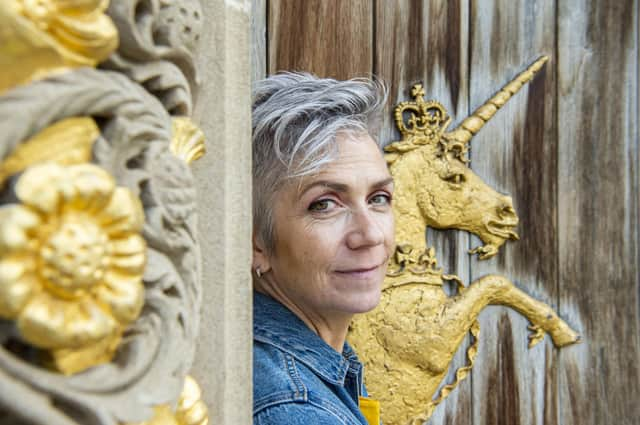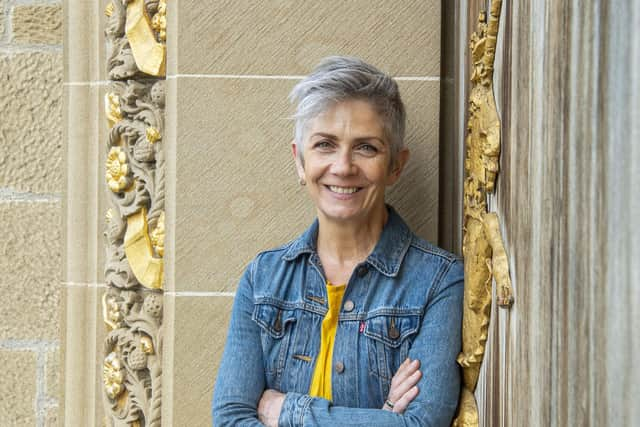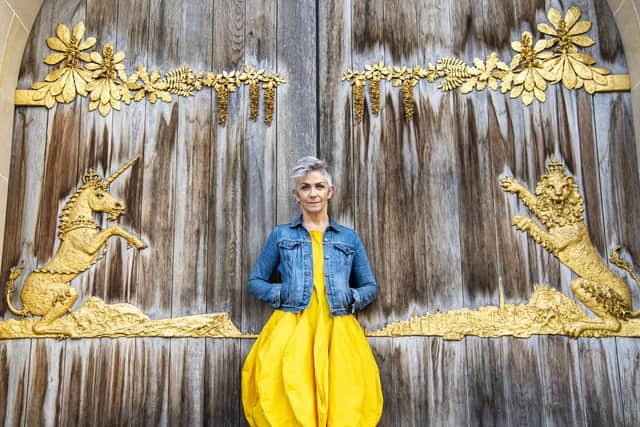Denise Mina looks at true crime in the heart of the capital in her latest book, Rizzio


A quiet Saturday evening supper party in the heart of an Edinburgh crammed with visitors suddenly descends into violence and mayhem ending with murder and a crime scene that wouldn’t look out of place in one of the True Crime podcasts beloved by writer Denise Mina.
One of the big hitters of crime fiction, she has turned her award-winning talents to the story of the murder of David Rizzio, friend and secretary of the unsuspecting hostess, 24 year-old Mary, Queen of Scots in her latest book, entitled Rizzio. A novella, it covers the 48 hours of the weekend of 9 March 1566, what Mina calls “a lost weekend” at Holyrood Palace, and is told in a direct, heart of the action, heat of the moment style that takes modern readers to the centre one of the darkest moments in Scotland’s bloody past.
The first of Polygon’s Darklands Series, in which top Scottish writers retell stories from our history, myth and legend, the aim is to serve up a punky, anarchic view of the past and Rizzio is full of parallels and sensibilities that chime with a contemporary audience.
Mary has convened her Parliament with a view to turning its focus towards Europe rather than England, there are political rivalries, love and loathing, sex and lies, a city full of uppity Scottish nobles reeling from the loss of land and wealth at the hands of the Queen, a populus enjoying the festival atmosphere who later emerge as loyal heroes, and way, way too much drinking.
That Saturday, despite the attempts of the heavily pregnant queen to ward off his attackers, the handsome Italian is dragged from the supper table as a gun is held to her swollen belly, he is stabbed by every man in court, including her husband Lord Darnley, and it is only the quick thinking of her lady in waiting, overlooked on account of being “a middle aged wumman” that sees Mary escape.
“It should feel like a real time event almost,” says Mina, who is known for her Garnethill trilogy, Paddy Meehan series and Alex Morrow series of books and finds herself increasingly drawn to true crime podcasts, such as Dirty John, Who the Hell is Hamish, Teacher’s Pet, True Crime Obsessed, My Favourite Murder and Last Podcast on the Left.
“I think that’s where it is narratively, at the moment and we are witnessing the birth of an art form. True crime uses them a lot and that’s something I love that. I'm developing a series with Canongate, getting prominent literary writers to do true crime stories in novella form, one of reasons I was so excited about Darklands. For it I went to Buenos Aires and investigated the case of Alberto Nisman who was murdered. I really hope there are more people writing these kinds of books because I love to read them.”


Meanwhile, back at the murder scene in Holyrood, Mina wants to shine a light on a true crime that history has blurred.
“With Mary, Queen of Scots there are so many dramatic events just after this, I suspect that's why this is ill remembered. People know somebody was killed, and they know lots of people killed him, but they don't really know what it was about. I think focusing in really tight on a historical event is an interesting way to examine what was actually going on otherwise it becomes just a chronology, and it’s hard to analyse or put into context - although Hilary Mantel is amazing at that. But I didn't want to write 900 pages,” she says and laughs.
The story opens with Rizzio and Lord Darnley playing tennis at Holyrood, and Rizzio is winning. He might have been Mary’s favourite but the charming Italian has raised hackles elsewhere with what Mina calls his “boss outfits” and musical and language skills.
“He was famous for wearing lots of fancy clothes which you can imagine attracted attention as the Calvinist revolution has just happened, and he’s noncing about in these velvet tights. They were so expensive that Elizabeth the First had introduced a rule that only the eldest son of the family was allowed to buy and wear them because people were bankrupting themselves buying them. Later in the story, when a guy kneels in blood, it's actually a big deal. It’s like crashing your Ferrari, he’s f***ed his tights. But Rizzio was famous for wearing really nice clothes and being a bit of a trendsetter, an influencer, which was another reason to hate him because people hate influencers. Imagine John Knox’s son-in-law (John Kerr, the conspirator who brushed Mary’s belly with a gun) faced with an influencer. It was that dynamic,” she says and laughs.
![Rizzio, Denise Mina, £10 hardback, is published by Polygon on Thursday [2 September] and also in ebook.](https://www.scotsman.com/webimg/b25lY21zOjM3YjFlNjU1LWYyMDAtNGNiNS05MWIxLTdjODg5YmY1MTIwMzpjZGY1NjEyYi1jMzMzLTRlYWEtYjc0Zi00MjVjZTYyYzRkNDk=.jpg?crop=3:2,smart&width=640&quality=65)
![Rizzio, Denise Mina, £10 hardback, is published by Polygon on Thursday [2 September] and also in ebook.](/img/placeholder.png)
“There’s a bit where somebody walks in when the Queen’s peeing and he just styles it out, acts as if that was always meant to be. Also the character Yair’s [henchman of the conspirators] internal monologue of ‘I f***king hate tennis’, I wanted to sound like a twitter rant, because I think people write on Twitter very succinctly and it’s very familiar to us. It won’t be in 15 years time, won't have that resonance, but it's that absolute position in a paragraph that tells you everything about the character. He just hates tennis and doesn't understand what's wrong with these people.”
Zooming in on events, the aim of the series is to make history more appealing and in so doing, Mina is able to dispense with explanation and context and cut to the chase.
“If you just jump into it and follow the action, then you can cut out a lot of context and explanation. It's something true crime does a lot. I don't think your audience always want to see your working, I think they want a story. So by focusing closely on a small time frame you're cutting out all the what shoes were like - you just don't have time to tell that story - and you get closer to the characters because you're not thinking about how different it all was from now. Because it's very similar really.”
Certainly the themes are similar. Death, intrigue, conspiracies, murder, love and loyalty, and the lengths to which people will go to gain control.


“I think it's a power grab, which is an eternal theme,” says Mina. “And I think it's about misogyny, and fear of the other, because Mary is a foreigner and Rizzio is a foreigner. And I think it is also very much about the ancient Scottish argument about whether we should align ourselves with England or Europe. That goes back beyond the EU, and beyond The Reformation to Scotland's realization that we’re a small country on the edge of Europe and because of that, we had a lot of power because we are the hinge point of England and Ireland and Wales’ relationship with Europe.”
“I think another big theme is drunkenness, because they’re all wasted the whole time! We forget that in history, until very recently - we're such a puritanical age - everyone was drunk all the time. Churchill was wasted for the whole of the War. People drank all day every day because it was safer and cheaper than clean water. So this is like a lost weekend and they must have been blacking out at various times.”
Apart from Mary, Queen of Scots, who is six months pregnant, and her lady in waiting, Lady Huntly, who masterminds the queen’s escape. With one woman being middle aged at 53, therefore invisible, and a pregnant queen, Mina reckons the misogyny of the male court and nobles was behind the attack on a female queen, as well as integral to the plot, as it’s an intrinsically female ruse that is used to help Mary escape.
“I've seen a lot of fictional representation of Scottish history, and it's just all men. And, you know, that's really not what happens, but that’s what we’re told. There are equally heroic stories of women with the same trajectory, and interesting tales of escape and survival.
Mina’s way into the characters of Mary and Rizzio was assisted by her identification with them as outsiders as a result of their peripatetic childhoods, something Mina also experienced. The child of a draughtsman in the oil and gas industry and a “very glamorous housewife and telephonist” she moved around as a child.
“I think that’s so formational. You always have that kind of observer’s role everywhere you go. Having said that, I've been in Glasgow since 1986. And everyone I’ve talked to who says they loved moving around as a child, basically moved into a house and never moved again. So we didn't like it that much did we!”
“But Mary moved around a lot when she was a child, and Rizzio was born in Turin and sent off to study to be a secretary when he was very young and I think they really bonded over that. I understand that, meeting someone else who has that kind of perspective. Marilyn Monroe once said she could spot another orphan, a party. She could see someone across the room and know that they were an orphan, because it was so formative. And I can see someone across the room who had that kind of childhood. They’re observing.”
Being an outsider as a child was an ideal grounding for someone to grow up to become a writer and Mina started when she was around ten, although she didn’t see it in her future, unaware she would picking up various awards, such as the Theakston Old Peculier Crime Novel of the year Award twice, being inducted into the Crime Writers’ Association hall of Fame in 2014, winning the McIlvanney Prize for Scottish Crime Book of the Year 2017 and co-winning in 2019 and seeing her most recent novel, The Long Dead, shortlisted for the 2020 Costa Novel of the Year award.
“I just thought that was like wanting to be a pop star. I saw writers as men, very confident, very posh, they’d read everything and were authoritative, and wore capes. It’s not like that now, but in those days you didn't see women writers, and you didn't see people who were a bit shy. It just seemed like a big thing to be and I thought ‘oh nobody's gonna be interested in what I've got to say.’”
“Then I was working in a pub and William McIlvanney came in and he was working class and gracious to people, and he didn't seem narcissistic.”
Coupled with this chance meeting was the experience of living in London during the punk era with its ‘who says I can’t?’ ethos, when Mina would see wannabe designers selling their creations on market stalls - she bought shoes made from old tyres - musicians picking up a guitar and playing gigs.
“People just going for it, not needing confirmation that they’re good enough, or needing a degree, just doing it or making things and it doesn’t matter if they fall apart at a party. It’s such a great attitude.”
“It was just f***ing do it. That is exactly where I came from. Three chords, they might be shit, but they’re my shit, and I thought why don't I write the book I want to read. It really was punk entitlement and I didn't think it’d get published or anything, I just thought, you know, have a go. Also if you're quite shy, you’ve been embarrassed most of your life so I thought ‘if I fail, I'm not going to be more embarrassed am I?”
Watching Mina at the Edinburgh International Book Festival pre Rizzio publication event it’s hard to believe she’s shy as she confidently talks about the book and answers questions. When she remembers she’s being beamed live to an international audience as she declares herself a Socialist, calls Trump an arse and compares the loathsome Lennox to Donald Trump and his son Lord Darnley, Mary’s husband, to Trump Junior, she laughs, then continues in the same vein, confident in her own skin and opinions. If you don’t like it, so be it.
I tell her I think the audience did like it, judging from the laughter.
“I think it's nice if you agree, but if you don’t it’s annoying,” she says. “But you have to live with integrity - there are things I’ve spoken about that have been very unpopular - say what you want to say, then shut up. I think it's very important not to crow and not to bore.”
“People are not coming to you for opinions about lots of controversial things, they’re coming to you for entertainment. As crime writers, we are people’s comfort food and you have to be respectful of that. So I would always try not to lie, but sometimes I would shut up because I don’t think that everybody needs to know what I think all the time.”
“It was lovely being back at the book festival, but I think I am quite shy, like most people… I don't really like being observed, very much. I can do it now but the first time I spoke I hyperventilated and had to go to the side of the stage. I'm not that confident a speaker. If I do an event and it goes well, I just think I’m so sick of my own voice, I want to go home and have a read, and if it goes badly, I think, yeah, that's exactly how I expected it to go.” She laughs.
“I still feel a bit of a fool afterwards, and I think that’s quite healthy. I don’t think one person should sit and gibber on for an hour in front of people and everyone should listen - unless they're a comedian.”
Speaking of comedians Mina is about to work once more with Frank Skinner, making a TV follow up to their Boswell and Johnson programme (as well as another book due out next year, but she can’t talk about that).
“Frank and I did Boswell and Johnson and had such a good time, this time we’re about to start filming Coleridge and Wordsworth. He’s Wordsworth and I’m Coleridge, who was a car crash,” she says.
“It’s based on The Lyrical Ballads and it’s so dramatic with the politics of the time. The French Revolution had just happened and turns really sour and they all have to backtrack and pretend they were never in favor. It’s really interesting how damaged they all were, and how Wordsworth then became this terribly worthy, dreary man and Coleridge was just a drug addled mess. He should have been a crime writer. He would have written brilliant novels but he was very under confident and Wordsworth was really dripping poison into his ear, saying don’t publish that and as the editions of The Lyrical Ballads went on, took out more and more of Coleridge’s poems. Eventually Coleridge started publishing his stuff because everyone was ripping him off - Byron, Walter Scott - but there was a massive falling out between them and they were slightly estranged for the rest of their lives. It’s a shame.”
While Skinner was happy to wig up last time round and this time probably, as Wordsworth, Mina isn’t so sure about costumes.
“I’m not confident enough,” she says. “Last time they got us full costumes and wigs and I said I’m a middle aged woman. I’m not dressing up in a costume on day one of filming because I’m going to spend the rest of the shoot thinking I’ve made a real fool of myself.”
With filming about to start, Mina finds herself back on the road after a lockdown spent at home in Glasgow with her family, including her 15-year-old son, enjoying the peace and calm.
“I kind of liked it,” she says, Apart from the massive anxiety of it, and my mum had Covid, but it’s just been nice to stop. It’s nice not to have to multitask like a motherfucker every single day.”
Having such a busy schedule it’s apt that Mina should embrace the short form novella, encapsulating the darkness and drama yet somehow managing to keep it light and at times funny.
“Isn’t it great that it’s a short read?” she says “Because books are getting fatter and fatter and to be able to sit down and read something maybe in one sitting and just be involved in it, to be able to start reading something and think ‘I’ll go to the toilet in a minute’ and then realise you’ve finished it and not been to the toilet. How great is that?”
Rizzio, Denise Mina, £10 hardback, is published by Polygon on Thursday [2 September] and also in ebook.
